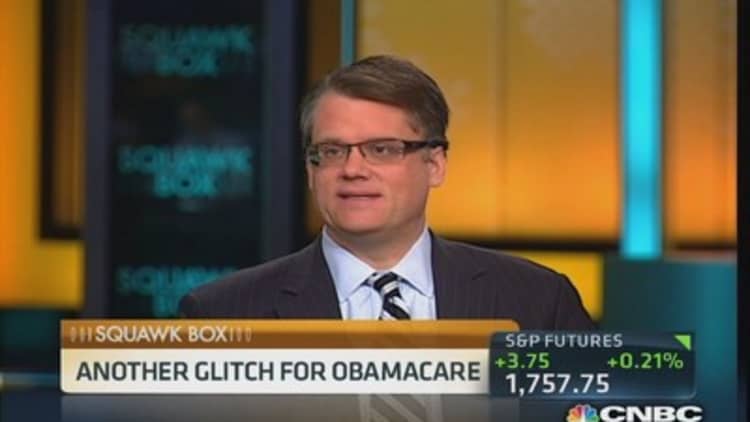
It's quickly turning into crisis time in Washington for President Barack Obama's health care reform law with the federal website crashing again and a series of hearings set for this week along with a major address from the president.
(Read more: )
The problems with HealthCare.gov are now well documented and continued with an outage on Sunday. But even if the website gets fixed by the end of November, as the White House promises, potentially bigger problems lie ahead.
(Read more: Another Obamacare glitch: Data center shuts down)
Middle income consumers are starting to get hit with sticker shock as previously low-priced plans get canceled and replaced with higher-dollar coverage. Stories of consumers getting plans canceled directly contradict Obama's promise that people who like their plans could keep them under the new law. Defenders of the law say that the new plans will be better. But they will also cost more at a time when wages are stagnant.
And many of these middle class consumers hit by higher rates do not qualify for the federal subsidies intended help millions of lower income consumers get covered, many for the first time. Anger from consumers is likely to add to already rising political pressure to delay or alter the law.
(Read more: Being 'just scared' an improvement: Goldman exec)
This is especially true for Democratic senators such as Mary Landrieu of Louisiana and Kay Hagan of North Carolina facing tough re-election battles next year in states Obama lost. A group of these vulnerable Democratic senators recently signed a letter to embattled Health and Human Services Secretary Kathleen Sebelius asking that the March 31st open enrollment deadline for Obamacare get pushed back.
Republicans in the House, meanwhile, may seek to increase the pressure this week by again voting to delay the mandate for individuals to buy insurance or face a tax penalty. Calls for an individual mandate delay, fiercely opposed by the administration, will likely becoming overwhelming if the federal website is not functioning seamlessly by Dec. 1. Even if the mandate is delayed, the millions of young, healthy and currently uninsured people the law depends on to make the economics work could ultimately decide paying the penalty is better than buying insurance. That could spark a "death spiral" for the law, an outcome that would be devastating for the Obama presidency and Democrats hopes in 2014 and beyond.
The hearings begin on Tuesday but the main event comes Wednesday when Sebelius squares off against Republicans at a House Energy and Commerce Committee hearing. Obama speaks on the health care law the same day at Faneuil Hall in Boston, the place then-Gov. Mitt Romney in 2006 signed the Massachusetts law cited as the model for Obamacare.
ALSO IN WASHINGTON THIS WEEK – The House-Senate budget conference begins Wednesday at 10 a.m. EDT with a meeting that should be little more than a photo-op and a chance for the 29 members to speechify on their priorities. No one in D.C. holds out much hope that the conference will produce any kind of "grand bargain" on spending, tax reform and entitlements.
There is some hope they could find a smaller bargain that replaces the 2014 sequester cuts with longer term entitlement changes. But that's also difficult in that Democrats won't agree to Social Security or Medicare cuts without significant additional tax revenues that Republicans view as impossible. The chances still seem greater that the committee fails and a much smaller group must cut another temporary deal to keep the government open and raise the debt ceiling again nearly next year.
— By Ben White, POLITICO's chief economic correspondent and a CNBC contributor. White also authors the daily tip sheet POLITICO Morning Money [politico.com/morningmoney] Follow him onTwitter @morningmoneyben.


